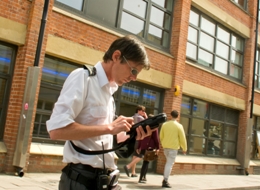30 May 2014
 Dirty work: we all know ‘somebody’s got to do it’. But workers in dirty work occupations like parking inspectors, morticians and animal control officers not only have to do the work, they also have to cope with the stigma attached.
Dirty work: we all know ‘somebody’s got to do it’. But workers in dirty work occupations like parking inspectors, morticians and animal control officers not only have to do the work, they also have to cope with the stigma attached.
Managing dirty work is the focus of a special lecture being held at the University of South Australia on June 10 featuring international expert Professor Blake Ashforth from Arizona State University.
UniSA’s Centre for Human Resource Management (CHRM) is hosting the Insights lecture at City West campus on a topic which Centre Director Professor Carol Kulik says is ‘taboo’.
“Many people perform jobs that others view as disgusting, degrading or repugnant,” Prof Kulik says.
“Think for example of exterminators, funeral and cemetery workers, or toilet cleaners. The services they provide are essential, but the stigma attached to these jobs can make the work challenging beyond its physical demands.
“Society knows that somebody’s got to do it, but society can look down on the particular somebodies who actually do the work.”
Prof Kulik says workers in dirty work occupations find it difficult to maintain a positive self-identity and they may become disengaged, perform their work poorly, or leave the occupation.
Prof Ashforth, who is the Horace Steele Arizona Heritage Chair in the WP Carey School of Business at Arizona State University, says the stigma of dirty work definitely adds an extra unwelcome layer of stress for workers.
“This stress is particularly strong when the workers interact with the public, especially clients, family, friends and neighbours,” Prof Ashforth says.
“There’s such a diversity of dirty work – from sewer workers to sex workers, correctional officers to used car salesmen – that there’s no real personality type that defines dirty workers.
“That said, to withstand the stigma of such work, workers do need to have some resilience.
“Fortunately, dirty work occupations tend to develop pretty strong organisational cultures. In these strong cultures, employees learn why their work really matters and develop coping mechanisms for dealing with stigma and the public.”
Prof Ashforth says it’s often very difficult for managers to fill low prestige dirty work positions, such as exterminators and bill collectors. Once in the role, the biggest challenges include adjusting to the part of the job that arouses distaste and justifying one’s job choice to family and friends.
“The good news is that, looking at workers who have made a successful transition, we’ve yet to find a job that no-one wants to do,” he says.
“So the management of the transition process is very important.
“The stigma that society heaps on dirty workers is unfair, given that society needs the work to be done. Managers play a very important role in helping the workers adjust to their work.
“Effective managers help workers find reasons to care about their work despite the stigma and help them adapt to the tasks that arouse stigma.”
Prof Kulik says management practices play a key role in helping dirty workers manage stigma. These practices might include training workers to deal with the public, rotating workers out of stigmatised tasks, and providing ‘backstage’ areas where workers can unwind.
“Our target audience is people who work in, or with, dirty work industries, but all members of the public are most welcome to attend the Insights lecture,” Prof Kulik says.
The lecture will be held on Tuesday June 10, 5.30pm for a 6pm start, in the Bradley Forum, level 5 of the Hawke Building at City West campus. For more information and to register go to: http://www.unisa.edu.au/Research/CHRM/Events/Insights/
Media contact: Kelly Stone office 8302 0963 mobile 0417 861 832 email Kelly.stone@unisa.edu.au



